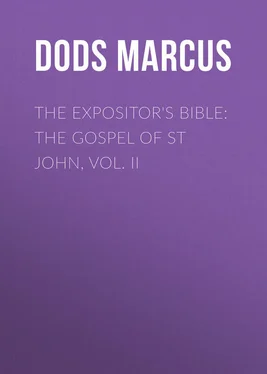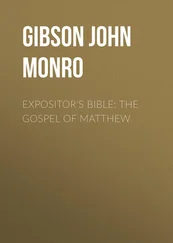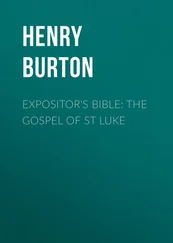Marcus Dods - The Expositor's Bible - The Gospel of St John, Vol. II
Здесь есть возможность читать онлайн «Marcus Dods - The Expositor's Bible - The Gospel of St John, Vol. II» — ознакомительный отрывок электронной книги совершенно бесплатно, а после прочтения отрывка купить полную версию. В некоторых случаях можно слушать аудио, скачать через торрент в формате fb2 и присутствует краткое содержание. Издательство: Иностранный паблик, Жанр: foreign_religion, foreign_antique, foreign_prose, на английском языке. Описание произведения, (предисловие) а так же отзывы посетителей доступны на портале библиотеки ЛибКат.
- Название:The Expositor's Bible: The Gospel of St John, Vol. II
- Автор:
- Издательство:Иностранный паблик
- Жанр:
- Год:неизвестен
- ISBN:нет данных
- Рейтинг книги:5 / 5. Голосов: 1
-
Избранное:Добавить в избранное
- Отзывы:
-
Ваша оценка:
- 100
- 1
- 2
- 3
- 4
- 5
The Expositor's Bible: The Gospel of St John, Vol. II: краткое содержание, описание и аннотация
Предлагаем к чтению аннотацию, описание, краткое содержание или предисловие (зависит от того, что написал сам автор книги «The Expositor's Bible: The Gospel of St John, Vol. II»). Если вы не нашли необходимую информацию о книге — напишите в комментариях, мы постараемся отыскать её.
The Expositor's Bible: The Gospel of St John, Vol. II — читать онлайн ознакомительный отрывок
Ниже представлен текст книги, разбитый по страницам. Система сохранения места последней прочитанной страницы, позволяет с удобством читать онлайн бесплатно книгу «The Expositor's Bible: The Gospel of St John, Vol. II», без необходимости каждый раз заново искать на чём Вы остановились. Поставьте закладку, и сможете в любой момент перейти на страницу, на которой закончили чтение.
Интервал:
Закладка:
This petition they address to Philip, not only because he had a Greek name, and therefore presumably belonged to a family in which Greek was spoken and Greek connections cultivated, but because, as St. John reminds us, he was “of Bethsaida of Galilee,” and might be expected to understand and speak Greek, if, indeed, he was not already known to these strangers in Jerusalem. And by their request they obviously did not mean that Philip should set them in a place of vantage from which they might have a good view of Jesus as He passed by, for this they could well have accomplished without Philip’s friendly intervention. But they wished to question and make Him out, to see for themselves whether there were in Jesus what even in Judaism they felt to be lacking – whether He at last might not satisfy the longings of their Divinely awakened spirits. Possibly they may even have wished to ascertain His purposes regarding the outlying nations, how the Messianic reign was to affect them. Possibly they may even have thought of offering Him an asylum where He might find shelter from the hostility of His own people.
Evidently Philip considered that this request was critical. The Apostles had been charged not to enter into any Gentile city, and they might naturally suppose that Jesus would be reluctant to be interviewed by Greeks. But before dismissing the request, he lays it before Andrew his friend, who also bore a Greek name; and after deliberation the two make bold, if not to urge the request, at least to inform Jesus that it had been made. At once in this modestly urged petition He hears the whole Gentile world uttering its weary, long-disappointed sigh, “We would see.” This is no mere Greek inquisitiveness; it is the craving of thoughtful men recognising their need of a Redeemer. To the eye of Jesus, therefore, this meeting opens a prospect which for the moment overcomes Him with the brightness of its glory. In this little knot of strangers He sees the firstfruits of the immeasurable harvest which was henceforth to be continuously reaped among the Gentiles. No more do we hear the heart-broken cry, “O Jerusalem, Jerusalem!” no longer the reproachful “Ye will not come to Me, that ye might have life,” but the glad consummation of His utmost hope utters itself in the words, “The hour is come that the Son of man should be glorified.”
But while promise was thus given of the glorification of the Messiah by His reception among all men, the path which led to this was never absent from the mind of our Lord. Second to the inspiriting thought of His recognition by the Gentile world came the thought of the painful means by which alone He could be truly glorified. He checks, therefore, the shout of exultation which He sees rising to the lips of His disciples with the sobering reflection: “Verily, verily, I say unto you, except a corn of wheat fall into the ground and die, it abideth alone: but if it die, it bringeth forth much fruit.” As if He said, Do not fancy that I have nothing to do but to accept the sceptre which these men offer, to seat Myself on the world’s throne. The world’s throne is the Cross. These men will not know My power until I die. The manifestation of Divine presence in My life, has been distinct enough to win them to inquiry; they will be for ever won to Me by the Divine presence revealed in My death. Like the corn of wheat, I must die if I would be abundantly fruitful. It is through death My whole living power can be disengaged and can accomplish all possibilities.
Two points are here suggested: (I.) That the life, the living force that was in Christ, reached its proper value and influence through His death; and (II.) that the proper value of Christ’s life is that it propagates similar lives.
I. The life of Christ acquired its proper value and received its fit development through His death. This truth He sets before us in the illuminating figure of the corn of wheat. “Except a corn of wheat fall into the ground and die, it abideth alone.” There are three uses to which wheat may be put: it may be stored for sale, it may be ground and eaten, it may be sown. For our Lord’s purposes these three uses may be considered as only two. Wheat may be eaten, or it may be sown. With a pickle of wheat or a grain of oats you may do one of two things: you may eat it and enjoy a momentary gratification and benefit; or you may put it in the ground, burying it out of sight and suffering it to pass through uncomely processes, and it will reappear multiplied a hundredfold, and so on in everlasting series. Year by year men sacrifice their choicest sample of grain, and are content to bury it in the earth instead of exposing it in the market, because they understand that except it die it abideth alone, but if it die it bringeth forth much fruit. The proper life of the grain is terminated when it is used for immediate gratification: it receives its fullest development and accomplishes its richest end when it is cast into the ground, buried out of sight, and apparently lost.
As with the grain, so is it with each human life. One of two things you can do with your life; both you cannot do, and no third thing is possible. You may consume your life for your own present gratification and profit, to satisfy your present cravings and tastes and to secure the largest amount of immediate enjoyment to yourself – you may eat your life; or you may be content to put aside present enjoyment and profits of a selfish kind and devote your life to the uses of God and men. In the one case you make an end of your life, you consume it as it goes; no good results, no enlarging influence, no deepening of character, no fuller life, follows from such an expenditure of life – spent on yourself and on the present, it terminates with yourself and with the present. But in the other case you find you have entered into a more abundant life; by living for others your interests are widened, your desire for life increased, the results and ends of life enriched. “He that loveth his life shall lose it; and he that hateth his life in this world shall keep it unto life eternal.” It is a law we cannot evade. He that consumes his life now, spending it on himself – he who cannot bear to let his life out of his own hand, but cherishes and pampers it and gathers all good around it, and will have the fullest present enjoyment out of it, – this man is losing his life; it comes to an end as certainly as the seed that is eaten. But he who devotes his life to other uses than his own gratification, who does not so prize self that everything must minister to its comfort and advancement, but who can truly yield himself to God and put himself at God’s disposal for the general good, – this man, though he may often seem to lose his life, and often does lose it so far as present advantage goes, keeps it to life everlasting.
The law of the seed is the law of human life. Use your life for present and selfish gratification and to satisfy your present cravings, and you lose it for ever. Renounce self, yield yourself to God, spend your life for the common good, irrespective of recognition or the lack of it, personal pleasure or the absence of it, and although your life may thus seem to be lost, it is finding its best and highest development and passes into life eternal. Your life is a seed now, not a developed plant, and it can become a developed plant only by your taking heart to cast it from you and sow it in the fertile soil of other men’s needs. This will seem, indeed, to disintegrate it and fritter it away, and leave it a contemptible, obscure, forgotten thing; but it does, in fact, set free the vital forces that are in it, and give it its fit career and maturity.
Looking at the thing itself, apart from figure, it is apparent that “he that loveth his life shall lose it; and he that hateth his life in this world shall keep it unto life eternal.” The man who most freely uses his life for others, keeping least to himself and living solely for the common interests of mankind, has the most enduring influence. He sets in motion forces which propagate fresh results eternally. And not only so. He who freely sows his life has it eternally, not only in so far as he has set in motion an endless series of beneficent influences, but inasmuch as he himself enters into life eternal. An immortality of influence is one thing and a very great thing; but an immortality of personal life is another, and this also is promised by our Lord when He says (ver. 26), “Where I am, there shall also My servant be.”
Читать дальшеИнтервал:
Закладка:
Похожие книги на «The Expositor's Bible: The Gospel of St John, Vol. II»
Представляем Вашему вниманию похожие книги на «The Expositor's Bible: The Gospel of St John, Vol. II» списком для выбора. Мы отобрали схожую по названию и смыслу литературу в надежде предоставить читателям больше вариантов отыскать новые, интересные, ещё непрочитанные произведения.
Обсуждение, отзывы о книге «The Expositor's Bible: The Gospel of St John, Vol. II» и просто собственные мнения читателей. Оставьте ваши комментарии, напишите, что Вы думаете о произведении, его смысле или главных героях. Укажите что конкретно понравилось, а что нет, и почему Вы так считаете.












